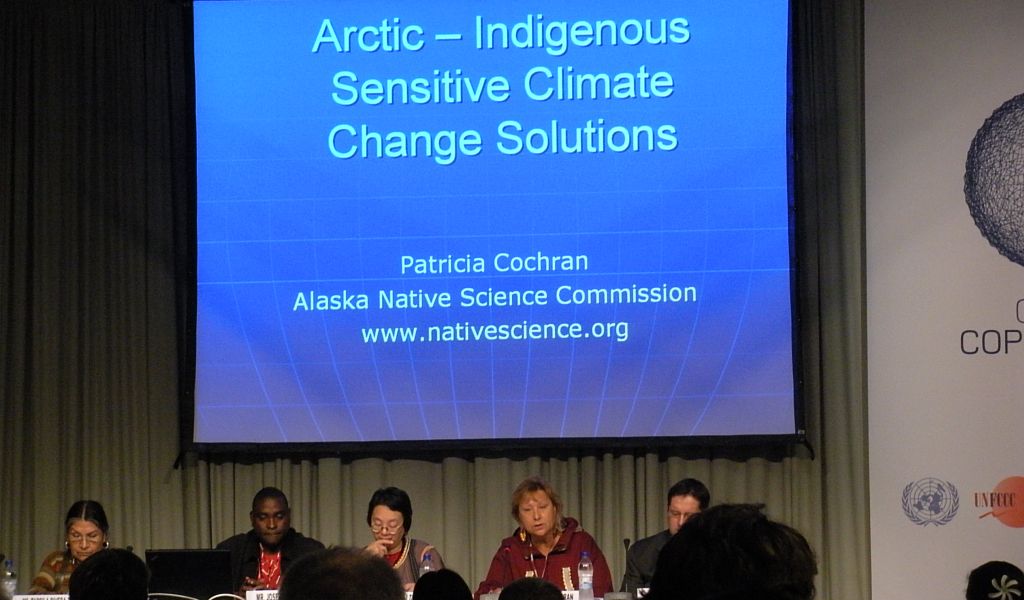Indigenous Sensitive Solutions?

Indigenous peoples and others filled the room yesterday afternoon for a Tebtebba side event on indigenous sensitive options for mitigation and adaptation. The session opened with an introductory statement by Vicky Tauli-Corpuz (Chair of the UN Permanent Forum on Indigenous Issues) who emphasized that despite having contributed ¾ of the greenhouse gases in the atmosphere causing increasingly severe natural disasters with direct consequences for indigenous peoples, “we can’t even get them to commit to financing for adaptation and technology transfer.” Seven years on, while US$ 100 billion is recognized as the amount of funds urgently needed for adaptation, total funding in the adaptation fund sits at around US$ 100 million.

UN-DRIP & REDD
John Henriksen, of the Expert Mechanism on Rights of Indigenous Peoples, highlighted the importance of at least some acceptance of the UN-DRIP as a principle in the negotiating text, describing the absence of any reference to human rights or indigenous peoples’ rights in the leaked Danish text as “worrying.” ‘Non-Paper 39,’ the latest ‘non-paper’ on REDD out of the Barcelona meetings, includes reference to indigenous peoples in 3 places, but this is unlikely to remain as part of any legally binding REDD agreement (should one emerge), as it faces opposition from Annex 1 countries including Canada, the United States and New Zealand.
I have been following these discussions since the Bangkok climate talks and something has been plaguing me – The countries that oppose reference to the UN-DRIP and related language in an international REDD agreement are all countries that have the institutions to address indigenous land rights claims and the domestic legal frameworks that would require them to do so. Does is matter that countries, such as Thailand and Vietnam, that do not even recognize that indigenous peoples exist within their borders are happy to sign onto an agreement that recognizes indigenous peoples’ right to free, prior and informed consent (FPIC) if domestically it will not be possible for them to implement this commitment? I don’t know the answer. Indigenous peoples’ rights should and must be recognized in the development and implementation of REDD for both ethical and practical reasons. But part of me wonders how beneficial mention of this in an international REDD agreement will really be for indigenous peoples managing forests today and whether it might be side-stepping the real issue - weak national governance which fails to acknowledge indigenous and customary rights. It seems to me that in Asia-Pacific, the national level (with potential to create pressure at the regional level) is where efforts to address recognition of indigenous rights are most urgently and usefully needed.
As one successful example of efforts at the national level, indigenous peoples representatives have been able to get the Waxman-Markey bill of the US House of Representatives changed to include funding for indigenous peoples’ adaptation. It remains to be seen whether this change will be included in the Senate version of the bill currently being debated.
Indigenous Knowledge
While there is (and should be) much discussion of the importance of indigenous knowledge, its equal standing with “western” science and reflecting this in the negotiating text, less has been said about how to elevate indigenous knowledge to its rightful place in climate change policy-making and planning.
The Alaska Native Science Commission (http://www.nativescience.org/) offers one model to consider – the Alaska Traditional Knowledge and Native Foods Database (http://www.nativeknowledge.org/login.asp), and online database of indigenous knowledge and foods. As Patricia Cochran of the Commission described, the database is taking indigenous knowledge beyond anecdotal making it available for indigenous peoples (e.g. whalers in Alaska) and a wider audience as well.
Ecosystem Approach
Those of us who see REDD as just one potential part of a wider landscape management strategy will find support in a recent CBD report about biodiversity and climate change (http://www.cbd.int/doc/publications/cbd-ts-41-en.pdf). The report finds that a REDD agreement that focuses on carbon alone will fail because it does not reflect the full value of forests. A clear message from the CBD to the UNFCCC according to Joji Carino of Tebtebba - if you are serious about REDD, it should include reference to the UN-DRIP to ensure that IPs are engaged.

